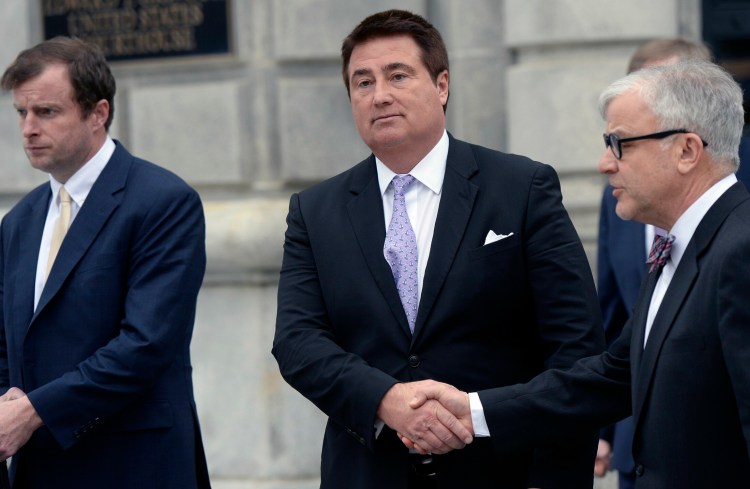Michael Liberty’s lawyers told a federal judge Tuesday that their client is accepting President Trump’s pardon, but a host of legal woes still loom for the former Portland developer.
Trump pardoned Liberty, who pleaded guilty to illegal political donations and faced wire fraud and securities fraud charges in federal court in Portland, on the former president’s last full day in office. The pardon wipes out Liberty’s guilty plea in 2016 for having made illegal contributions to Mitt Romney’s 2012 presidential campaign, along with more recent criminal charges he faced.
Liberty made contributions in other people’s names to evade limits on campaign donations, and he paid a $100,000 fine and served four months in federal prison in late 2017.
Liberty, who grew up in Gray, was a major developer in Portland in the 1980s. His projects included two mid-rise office towers on Middle Street and the Chandler’s Wharf condominiums. But when he proposed an office and commercial project on Long Wharf, opponents put a measure on the city ballot for a moratorium on non-marine development of the waterfront. The measure passed, and Liberty largely left Maine to look for other projects elsewhere.
He now lives near Orlando, Florida.
Liberty was expected to face trial on wire and securities fraud charges in September, along with his business associate Paul Hess. Federal authorities alleged that Liberty and Hess raised millions from investors for Mozido, a financial technology company that Liberty founded in Austin, Texas. The company, now named Fintiv, is working on developing an electronic “mobile wallet,” with financial tools primarily for those who don’t use a traditional bank.
In the indictment, authorities allege that Liberty and Hess raised the money from investors, who were told that their investments would go into Mozido and that Hess was not being paid to raise the money.
Instead, the indictment alleges, Liberty used some of the money for his personal expenses, and Hess was in fact paid commissions for finding investors.
Liberty’s lawyers told federal Judge George Z. Singal in a conference call Tuesday that Liberty was accepting Trump’s pardon. According to court documents, Singal said that meant the case against Liberty was “resolved,” and he ordered government lawyers to file a status report on the case against Hess by March 5.
But accepting the pardon could mean that prosecutors might force Liberty to testify in the case against Hess. Liberty can’t argue that to avoid incriminating himself he shouldn’t be compelled to testify because the pardon protects him, said Paul Mills, a Farmington lawyer. Mills has studied the pardon of Maine businessman Charles Morse by President William Howard Taft and wrote about it recently in The Ellsworth American.
Morse, at one time one of the richest Americans, had been convicted of misusing bank funds and making false bookkeeping entries and was serving a 15-year prison sentence when he petitioned Taft for a pardon, arguing that he would die in prison. Taft appointed a panel of experts who concluded that Morse was dying of kidney disease, Mills wrote, when in fact Morse had been drinking soap suds and chemicals to appear ill.
Taft in 1912 pardoned Morse, who went on to live for 21 years, and Taft often cited the case to explain his distrust of expert opinions.
Mills also said that Liberty’s pardon doesn’t cover civil cases, which means a lawsuit filed by the U.S. Securities and Exchange Commission in 2018 against Liberty and others can likely move ahead. The SEC charged Liberty and the others with defrauding investors of nearly $50 million, but the case was on hold while the criminal case, filed a few months after the civil case, was pursued.
Thimi Mina, Liberty’s lawyer, said that his firm is monitoring the SEC claims, and that he wouldn’t comment on the Hess case until government lawyers tell the judge how they plan to proceed. Hess’ lawyer said last week that the most serious charges were primarily lodged against Liberty.
Mina declined further comment on Liberty.
The pardon also likely means that the SEC can continue to seek millions from Liberty in a case in Pennsylvania. There, regulators accused Liberty of defrauding investors, including a Philadelphia city pension and retirement board. In 2010, he agreed to settle and was ordered to pay a $6 million fine, although he admitted no wrongdoing.
Then, he told a judge that his net worth was negative $29 million, and the judge agreed to cut the fine to $600,000. Three years ago, the SEC went back to court and said Liberty lied about his finances, and it asked the judge to assess the full $6 million fine against Liberty.
The judge hearing that case agreed to put it on hold while the criminal charges went ahead in Maine, but presumably the SEC will be able to resume pressing its case now that the criminal matter is resolved.
Send questions/comments to the editors.




Comments are no longer available on this story